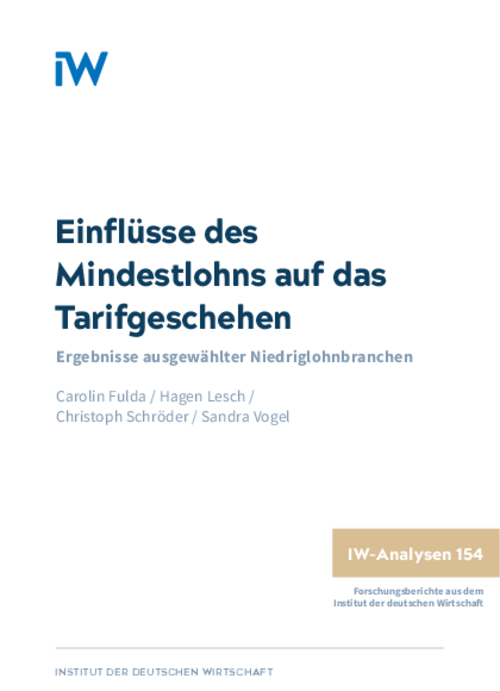This analysis examines the connection between collective wage bargaining in Germany and the adjustments to the statutory minimum wage determined by the Minimum Wage Commission since June 2020.

The Influence of the Minimum Wage on Collective Bargaining

This analysis examines the connection between collective wage bargaining in Germany and the adjustments to the statutory minimum wage determined by the Minimum Wage Commission since June 2020.
It also looks at the impact of the government’s intervention in the adjustment mechanism in 2022. The sectors studied include agriculture, meat processing, bakery, retail, floristry, hospitality, chain restaurants, private security services, building cleaning and hairdressing, in each case focusing on the collective bargaining areas of North Rhine-Westphalia and Berlin-Brandenburg. The combination of quantitative and qualitative methods shows that collective bargaining was most strongly influenced by the government’s decision to increase the hourly minimum wage to 12 euros with effect from October 2022, a move which threatened to inval¬idate many of the wage brackets in existing collective contracts. In most of the industries studied, however, it proved possible to adjust the agreed wage structures. Expiring collective agreements were mostly renewed as normal, while in some cases the collective bargaining rounds were brought forward. The fact that the latest increase in the minimum wage, announced in June 2023, was once again fixed by the Minimum Wage Commission has restored some predictability to the decision process. This makes it easier for the col¬lective bargaining parties to keep pace with the minimum wage adjustments and gradually restore the differentials of the partially compressed collective wage structures.

The Influence of the Minimum Wage on Collective Bargaining

More on the topic

German Wage Policy between Inflation and Stagnation: Are Conflicts with the Aims of Monetary Policy Looming?
After the economic and financial crisis of 2008/9, the German labour market soon began to recover, creating scope for a comparatively expansive wage policy.
IW
The Pros and Cons of Trade Union Membership
The decline in collective bargaining coverage in Germany is often attributed to the reluctance of companies to join an employers' association which negotiates collective agreements.
IW